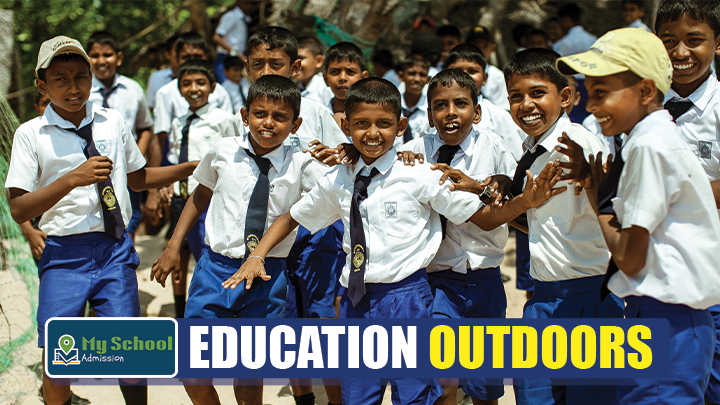Have you ever seen a child's eyes light up when they discover something new? Perhaps it is watching animals at the zoo, walking around an old fort, or seeing a science experiment work. That is the spark of curiosity that is lit, when learning becomes a thrilling hands-on experience.
Classrooms provide us with shape and knowledge, but often the best lessons take place outside of those four walls. That is where field trips come in, not just as fun outings, but as rich experiences that induce curiosity and form lasting memories.
Let's talk about how field trips generate curiosity, set learning off, and are a crucial part of shaping young minds.
What are school field trips?
We all cherish the memory of school field trips. Taking the bus with friends, excitement at traveling to a new place, brown bagged lunches, and the sheer joy of leaving the classroom.
But school excursions are more than an enriching break from routine. They make learning possible by converting theory into practice.
Imagine learning about ancient kings and then going to a historic site. Learning about ecosystems in class and then walking across a nature reserve. Classes are now narratives, facts become experiences.Field trips make learning tangible, real, and memorable.
Field trips for students : Viewing the World with Fresh Eyes
Children are inquisitive. They have plenty of things going on in their heads like "why," "how," and "what if."
But in the class context, sometimes there is not much opportunity to branch out of the syllabus. That is why it is very necessary to venture beyond the classroom. A visit to a planetarium makes space mysteries tangible. A farm trip demonstrates biology in action. A visit to a museum brings abstract notions into focus, students can see and touch it.
They spark curiosity. They guide children to ask more questions, learn about new ideas, and develop a passion for learning.
Real-World Connections: Making Lessons Stick
One of the greatest advantages of field trips is how they enable children to equate classroom education with the real world.
When kids experience history, science, art, or geography, they learn. It is no longer memorizing facts to pass an exam but understanding how the facts impact everyday life.
For example, a math lesson on measurement becomes real on a visit to a construction site. Environmental science becomes relevant when taking part in a cleanup trip or on a nature walk. Art and culture lessons become alive on visits to galleries or arts festivals. These real uses leave a lasting impact. Students learn and remember what they see, do, and go through so much more than what they merely read or hear.
Developing Social Skills and Confidence
Field trips do more than just enhance educational acumen. Field trips help children grow socially and emotionally by stepping out of their comfort zone.
During a field trip, students interact with other people, work in teams, learn to adapt to new environments, and solve small life problems. Through these experiences, they are more confident, better at communication, and more independent.
Getting out of the daily grind and exploring new territories gives children a chance to observe, get involved, and learn from what they see around them. The skills thus gained are not only important for success at school but for life beyond school as well.
Finding Secret Interests and Hobbies
Each child has special talents and interests. Sometimes, it just takes experiencing new things to know what really gets them energized.
Going to a science museum may ignite the imagination of a future engineer. A field trip to a theatre production may stimulate creativity. Nature walks may generate an interest in preserving the environment.
Field trips open up possibilities children may not have considered. Field trips introduce students to new occupations, professions, and recreational activities, broadening their horizon and making them dream bigger.Most adults realize that their hobby goes back to some experience they had in childhood, typically on a school field trip.
Mutual Experiences and Lifelong Memories
Go ask adults to talk about their school lives and they will remember field trips as among their cherished recollections. The excitement of experiencing something new, the joy of companionship with peers, the sense of freedom and discovery, all create memories that last a lifetime.
Field trips consolidate teacher-student relationships. They help build trust, create shared experience, and enhance the enjoyment of learning.
If children associate school with pleasant experiences and joyful memories, they will be more positive in their attitude towards learning. They become more engaged, motivated, and inclined to acquire new knowledge.
What Makes a Great Field Trip?
Not every field trip is equal. The best ones are thought out to maximize learning and curiosity "The Best Field Trip"
A successful field trip:
- Makes a direct connection to what is taught in the classroom
- Engages students to question and act actively
- Offers safe, inclusive learning experiences for every student
- Includes reflection time and discussion following the trip
- Is exciting, wondrous, and leads to meaningful understanding
Schools that value significant field trips demonstrate their dedication to creating whole, curious, and assured learners.
They foster critical thinking, social skills, and a passion for discovery in children.
Find the Right School That Sparks Curiosity
At My School Admission, we are convinced that learning needs to be fun, inspiring, and full of possibilities to venture beyond the classroom.
If you are looking for a school where your child will cultivate curiosity, confidence, and a lifetime passion for learning, we are here to assist you.
Discover schools that foster your child's potential, appreciate genuine world experiences, and have faith in learning that ignites curiosity.
Go to www.myschooladmission.com and begin searching for your ideal school today.


Leave a comment